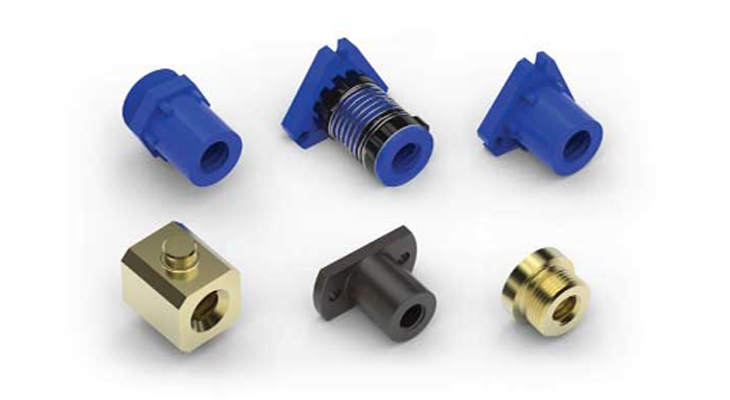By:
Christopher Nook
Comparing Acme Nuts and Acme Nut Material

Not Sure Which Material to Use for Your Acme Nuts?
Learn the basics of the materials used in acme nuts and how to compare them with our helpful Nut Materials Selection Guide that we have created for you. Please note that all Helix materials used have been selected for low friction, minimum wear, long life, and clean operation.
1. Bronze Acme and Trapezoidal Nut:
Special high tensile bronze is selected for smooth running, anti-wedging bronze nuts.
- Material: Bronze
- Tensile Yield: 50,000 psi
- Tensile Ultimate: 65,000 psi
- Hardness: HB75
- Dynamic coefficient of friction: 0.125 with lubricant
2. Plastic Acme and Trapezoidal Nut:
The high strength and inherent lubricity of plastic acme and trapezoidal nut material can result in product life that equals or exceeds conventional nut materials.
- Material: Plastic
- Tensile Strength at 70°F: 8,000 psi
- Compressive Strength at 70°F: 16,000 psi
- PV Limit: 2,700 lubricated
- Co-efficient of friction: 0.10 lubricated
3. PowerAc™ Flanges for Bronze and Plastic Nuts:
Made from carbon steel with a black oxide finish.
| ACME & TRAPEZOIDAL | STAINLESS STEEL | |
| Screw Material | 4140 | 300 Series |
| Minimum Hardness | 200 brinnel | 170 Brinnel |
| Tensile Ultimate Strength | 95,000 psi | 85,000 psi |
| Finish | Black Oxide | Natural |
| SCREW TYPE | MATERIAL | THREAD CLASS | LEAD ACCURACY | SCREW DIA. |
| Rolled | Alloy | Centralizing 2C or Stub | ±.0003"/" up to 21⁄2" dia. | 1⁄4" to 6" |
| Stainless | Centralizing 2C or Stub | ±.0003"/" up to 11⁄2" dia. | 1⁄4" to 11⁄2" | |
| Milled | Alloy | Centralizing 2C or 3C | ±.002"/ft | 1⁄2" to 3" |
| Stainless | Centralizing 2C or 3C | ±.002"/ft | 1⁄2" to 3" | |
| Ground | Alloy | Centralizing 3C or 4C | ±.0005"/ft | 1⁄4" to 4" |
| Stainless | Centralizing 2C or 3C | ±.0005"/ft | 1⁄4" to 4" |
Comparing and Contrasting Helix Acme Nut Material Options:
The next step in determining which of these acme nut materials you would like to use for your product would be to compare each material based on 3 essential measures:
- Wear Factor
- Coefficient of Friction
- Tensile Strength


